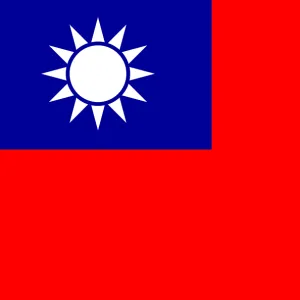
Taiwanese Novels in Translation
I met some wonderful people during my time as a grad student, many of whom taught me about their home countries’ rich histories and cultures. One of my very closest friends was born and raised in Taiwan, and after having spent many years in America, she wound up returning to her birthplace to teach and spend more time with her family. I miss her like crazy, but we still keep in touch. AND she can keep me up to speed regarding the book culture over there.
I recently asked her to recommend some Taiwanese novels in English translation, and here are the four she suggested. They were all published by Columbia University Press under the series title “Modern Chinese Literature From Taiwan.” Enjoy!
 Wild Kids by Chang Ta-Ch’un, transl. by Michael Berry (2000)
The two novels that make up Wild Kids are the first English translations of works by Taiwan’s most famous writer. In My Kid Sister and Wild Child, Chang offers us a glimpse into the angsty lives of teenagers in 1980s Taiwan. With humor and irony, Chang portrays dysfunctional families, teen love, and the Taiwanese underworld, as well as the desperation and despair that drives these teens from their families.
Wild Kids by Chang Ta-Ch’un, transl. by Michael Berry (2000)
The two novels that make up Wild Kids are the first English translations of works by Taiwan’s most famous writer. In My Kid Sister and Wild Child, Chang offers us a glimpse into the angsty lives of teenagers in 1980s Taiwan. With humor and irony, Chang portrays dysfunctional families, teen love, and the Taiwanese underworld, as well as the desperation and despair that drives these teens from their families.
 Rose, Rose, I Love You by Chen-ho Wang, transl. by Howard Goldblatt (1984, 1998)
Described as a “ribald satire,” Rose, Rose, I Love You describes what happens when a Taiwanese village learns that 300 GIs are coming for a visit from Vietnam. The townspeople, and especially a teacher named Don Siwen, want to welcome them in style and eh hem, give them a good impression. So of course Siwen sets up a school for fifty of the town’s most promising prostitutes and offers courses like “Introduction to American culture” and “personal hygiene.” It will be up to these girls to make the GIs think fondly of Taiwan when it’s time to leave.
Rose, Rose, I Love You by Chen-ho Wang, transl. by Howard Goldblatt (1984, 1998)
Described as a “ribald satire,” Rose, Rose, I Love You describes what happens when a Taiwanese village learns that 300 GIs are coming for a visit from Vietnam. The townspeople, and especially a teacher named Don Siwen, want to welcome them in style and eh hem, give them a good impression. So of course Siwen sets up a school for fifty of the town’s most promising prostitutes and offers courses like “Introduction to American culture” and “personal hygiene.” It will be up to these girls to make the GIs think fondly of Taiwan when it’s time to leave.
 Notes of a Desolate Man by Chu T’ien-wen, transl. by Howard Goldblatt and Sylvia Li-chun Lin (1999)
As a winner of the esteemed China Times Novel Prize, Notes is an important addition to modern literature, chronicling the marginalized life of a gay man in contemporary Taiwan. A “postmodern” novel, it employs metaphor and allusion, classical Chinese poetry and first-person perspective to give us a glimpse into life on the edge.
Notes of a Desolate Man by Chu T’ien-wen, transl. by Howard Goldblatt and Sylvia Li-chun Lin (1999)
As a winner of the esteemed China Times Novel Prize, Notes is an important addition to modern literature, chronicling the marginalized life of a gay man in contemporary Taiwan. A “postmodern” novel, it employs metaphor and allusion, classical Chinese poetry and first-person perspective to give us a glimpse into life on the edge.
 A Thousand Moons on a Thousand Rivers by Hsiao Li-Hung, transl. by Michelle Wu (2000)
Detailed yet vast in scope, A Thousand Moons portrays life in a southern Taiwanese coastal town in the 1970s, a time of upheaval and change as an agriculture way of life gives way to industrialization. Here we follow Zhenguan, a young woman raised in the traditions of her ancestors, but also drawn to the city and its enticements. Hsiao enriches this story with Buddhist maxims, poetry, folk songs, and puns to give us an intimate sense of this specific cultural and historical moment.
A Thousand Moons on a Thousand Rivers by Hsiao Li-Hung, transl. by Michelle Wu (2000)
Detailed yet vast in scope, A Thousand Moons portrays life in a southern Taiwanese coastal town in the 1970s, a time of upheaval and change as an agriculture way of life gives way to industrialization. Here we follow Zhenguan, a young woman raised in the traditions of her ancestors, but also drawn to the city and its enticements. Hsiao enriches this story with Buddhist maxims, poetry, folk songs, and puns to give us an intimate sense of this specific cultural and historical moment.
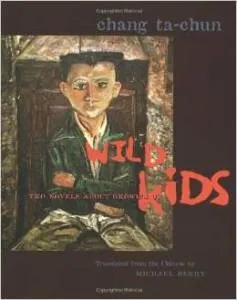 Wild Kids by Chang Ta-Ch’un, transl. by Michael Berry (2000)
The two novels that make up Wild Kids are the first English translations of works by Taiwan’s most famous writer. In My Kid Sister and Wild Child, Chang offers us a glimpse into the angsty lives of teenagers in 1980s Taiwan. With humor and irony, Chang portrays dysfunctional families, teen love, and the Taiwanese underworld, as well as the desperation and despair that drives these teens from their families.
Wild Kids by Chang Ta-Ch’un, transl. by Michael Berry (2000)
The two novels that make up Wild Kids are the first English translations of works by Taiwan’s most famous writer. In My Kid Sister and Wild Child, Chang offers us a glimpse into the angsty lives of teenagers in 1980s Taiwan. With humor and irony, Chang portrays dysfunctional families, teen love, and the Taiwanese underworld, as well as the desperation and despair that drives these teens from their families.
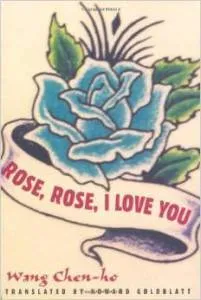 Rose, Rose, I Love You by Chen-ho Wang, transl. by Howard Goldblatt (1984, 1998)
Described as a “ribald satire,” Rose, Rose, I Love You describes what happens when a Taiwanese village learns that 300 GIs are coming for a visit from Vietnam. The townspeople, and especially a teacher named Don Siwen, want to welcome them in style and eh hem, give them a good impression. So of course Siwen sets up a school for fifty of the town’s most promising prostitutes and offers courses like “Introduction to American culture” and “personal hygiene.” It will be up to these girls to make the GIs think fondly of Taiwan when it’s time to leave.
Rose, Rose, I Love You by Chen-ho Wang, transl. by Howard Goldblatt (1984, 1998)
Described as a “ribald satire,” Rose, Rose, I Love You describes what happens when a Taiwanese village learns that 300 GIs are coming for a visit from Vietnam. The townspeople, and especially a teacher named Don Siwen, want to welcome them in style and eh hem, give them a good impression. So of course Siwen sets up a school for fifty of the town’s most promising prostitutes and offers courses like “Introduction to American culture” and “personal hygiene.” It will be up to these girls to make the GIs think fondly of Taiwan when it’s time to leave.
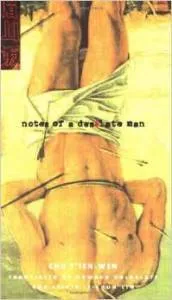 Notes of a Desolate Man by Chu T’ien-wen, transl. by Howard Goldblatt and Sylvia Li-chun Lin (1999)
As a winner of the esteemed China Times Novel Prize, Notes is an important addition to modern literature, chronicling the marginalized life of a gay man in contemporary Taiwan. A “postmodern” novel, it employs metaphor and allusion, classical Chinese poetry and first-person perspective to give us a glimpse into life on the edge.
Notes of a Desolate Man by Chu T’ien-wen, transl. by Howard Goldblatt and Sylvia Li-chun Lin (1999)
As a winner of the esteemed China Times Novel Prize, Notes is an important addition to modern literature, chronicling the marginalized life of a gay man in contemporary Taiwan. A “postmodern” novel, it employs metaphor and allusion, classical Chinese poetry and first-person perspective to give us a glimpse into life on the edge.
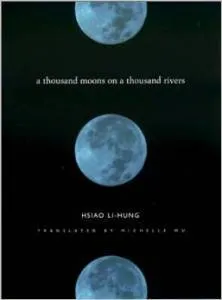 A Thousand Moons on a Thousand Rivers by Hsiao Li-Hung, transl. by Michelle Wu (2000)
Detailed yet vast in scope, A Thousand Moons portrays life in a southern Taiwanese coastal town in the 1970s, a time of upheaval and change as an agriculture way of life gives way to industrialization. Here we follow Zhenguan, a young woman raised in the traditions of her ancestors, but also drawn to the city and its enticements. Hsiao enriches this story with Buddhist maxims, poetry, folk songs, and puns to give us an intimate sense of this specific cultural and historical moment.
A Thousand Moons on a Thousand Rivers by Hsiao Li-Hung, transl. by Michelle Wu (2000)
Detailed yet vast in scope, A Thousand Moons portrays life in a southern Taiwanese coastal town in the 1970s, a time of upheaval and change as an agriculture way of life gives way to industrialization. Here we follow Zhenguan, a young woman raised in the traditions of her ancestors, but also drawn to the city and its enticements. Hsiao enriches this story with Buddhist maxims, poetry, folk songs, and puns to give us an intimate sense of this specific cultural and historical moment.












